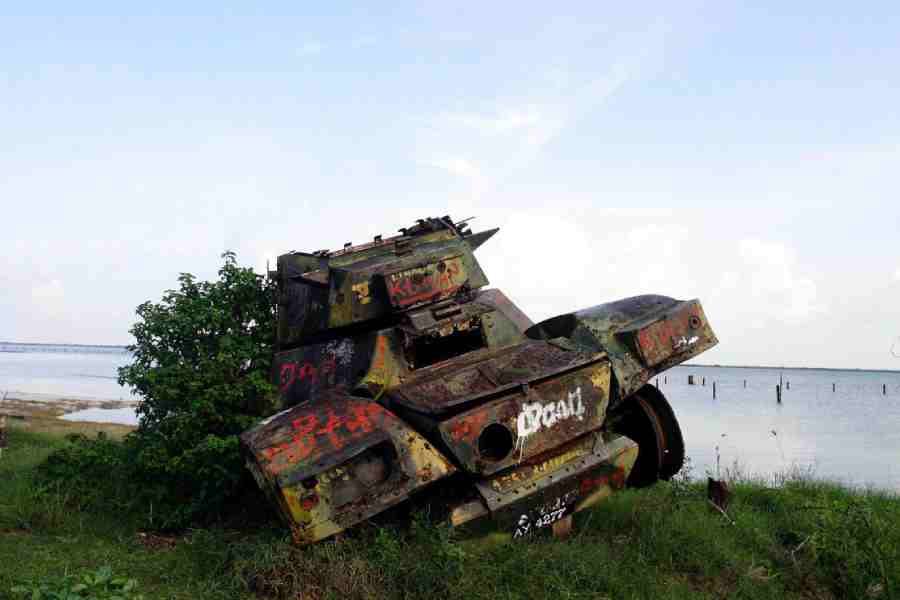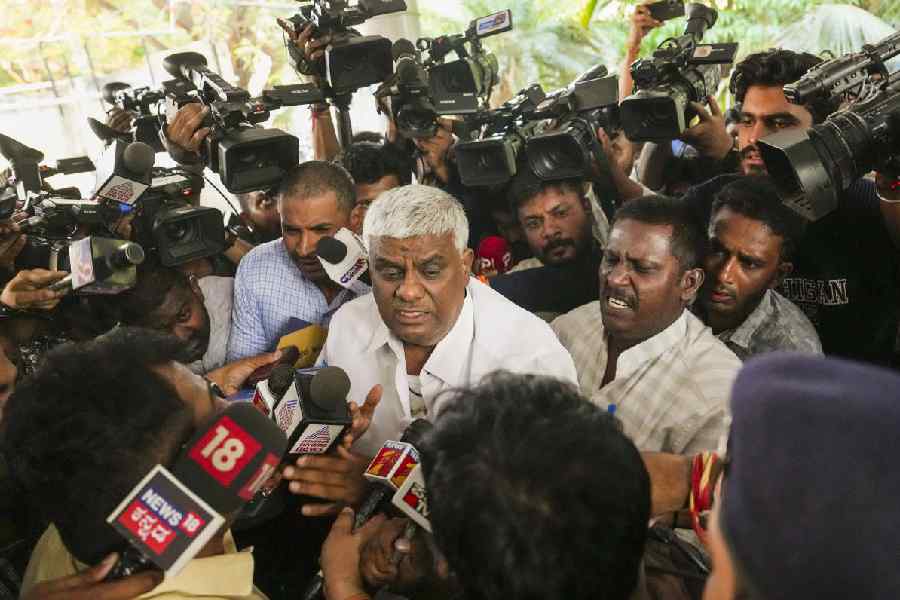In 2011, when I travelled in the Northern Province of Sri Lanka, I was one of the first musicians from India to tour and perform in the war-torn region in nearly three decades. That was made possible by the then Indian high commissioner, Ashok Kantha. But the person who first put this thought in our minds was Sithie Tiruchelvam, lawyer, human rights activist, and wife of Neelan Tiruchelvam, parliamentarian, lawyer and human rights activist. I had performed for the Neelan Tiruchelvam Trust in 2010 just after the civil war had ended. The theme was ‘Celebrating Diversity’. At the post-concert conversation, Sithie Tiruchelvam suggested such a tour and Ashok Kantha made it happen the following year.
We travelled in a bus for a week, from Colombo to Jaffna on to Kilinochchi, a detour to Mullaitivu, then off to Vavuniya and, finally, ending our tour with a concert in Colombo. This was just after the war; the physical scars were obvious — on the walls of houses and on the streets; discarded vehicles, damaged buildings, land mines, the army presence was overwhelming. The voice of the people mirrored the physical reality, the wounds were fresh, the tones angry, and the stories gut-wrenching. Many Tamils were still living in camps.
I went back to Jaffna for two more years, conducting an art festival called ‘Svanubhava’, taking from India many artists and art forms that the Jaffna Tamils loved and admired. When the celebrated Carnatic musician and playback singer, P. Unnikrishnan, arrived in Jaffna, it was as if Rajinikanth had descended. He needed extra security and his concert had about five thousand people in attendance. There were also those who criticised this initiative. They accused me of being a Rajapaksa stooge. Marxists believed that these festivals were aimed at creating a false sense of normalcy that manipulates the minds of people, steering them to forget the violence and the stark present. Expatriate Sri Lankan Tamils called some artists and asked them not to participate in what they framed as a festival conducted by the army. On my return, the Dravidar Kazhagam sent protesters to my performance in Chennai. Having interacted with the people of the Northern Province, my experience and understanding were different. The festivals did not make them forget, how could they? Music and dance are not hallucinogens; they are reminders of loss, respect, space, joy, heritage, culture and lives.
After a decade, in August this year, I went back to Jaffna with my friends, the writer, Perumal Murugan, the historian, A.R. Venkatachalapathy, and the publisher, Kannan Sundaram. We were there for a seminar on my book, Sebastian & Sons, and for a discussion with Perumal Murugan and A.R. Venkatachalapathy, both hosted by the University of Jaffna. The sessions were incisive, probing and critical. The questions from students and participants were no-holds-barred, making us all pause and reflect.
As my direct flight from Chennai landed in Jaffna, my mind veered towards the obvious question. Would Jaffna have changed? The roads were far better, the buildings finished, a greater number of people were milling around the streets, the bullet marks on the houses were missing, heritage structures had been renovated, there were walkways along the seafront. All these are signs of development, forward movement, aren’t they? The instinctive thought is, ‘Look how much things have improved.’ This is how we evaluate any society, even our own location. But these are not indications of what people feel, how they see themselves; neither do they point to that crucial human necessity — happiness. This is a state that comes from the empowerment of people’s emotional needs. Emotional concord is not an abstract, irrational quantity. It is evoked from personal, social and political fulfilment. This completeness or the nearing of that is the aim of living. To feel dignified, unfettered, to belong and share with delight. Economic scaffoldings will not achieve this end. They will, to some extent, bring an end to poverty and provide access to resources. People will use these facilities because they need to survive and move up the economic ladder, but that does not mean they are content. We have to look beyond the façade of normalcy that even basic infrastructure and structural tinkering provide. Oppression usually begins with socio-cultural usurpation; in the case of the Tamils, it has been the usurpation of their language and identity. And it can only end when the same is addressed through processes of restoration.
As we drove all around Jaffna, meeting many lovers of Tamil literature and music, stopping at places of literary and political significance, the conversations always came back to the lack of political will to give the Tamils their right over their land, equality, respect. The many small things we take for granted have to be negotiated, but negotiations are never on level ground. The wounds gouged by the civil war are still bleeding. Above all, the lack of any remorse from the State towards a history of oppression stings. There is today also an invasion of places of faith of the Tamils. The religious war is active. I know that I am unable to fathom or express that feeling of loss which sits deep within the stomach of the Tamils and eats at them from within. But I sense it when they speak of the present and the past. I hear it in the everyday stories they share, even in their laughter. The fact that the future is not part of these conversations is in itself telling.
There can be no memoir of travels in Jaffna without a mention of the Liberation Tigers of Tamil Eelam. Many in India, especially those intellectuals who exist outside the Tamil circumference, view the LTTE only as a terrorist outfit. Among the Tamil fraternity in India, the LTTE is often worshipped. The tiger symbol and the pictures of the LTTE leader, Velupillai Prabhakaran, are seen on autos, wall posters and some Tamil politicians use them to prove their Tamil-ness. Both these are the stances of outsiders. The other problem has been that in English writing, Indian voices have dominated the discourse. Of late, there has been next-generation diasporic writing but that is also a different voice.
Many Tamil writers from the Jaffna peninsula have written both prose and poetry. But their readings have largely remained within smaller groups. Artists from Sri Lanka have also spoken through their creations. Many of these expressions do not fall into the trap of categorisation. War, violence, history and struggle need nuanced and complex understanding, discussing and critiquing. The different inflections have to contest and respond to one another and there is no need for a resolved narrative. As an outsider, our role is only to listen, not to judge.
We forget that Tamils are not a homogeneous group. They occupy different regions and have different cultures, histories and dialects. And they were each viewed and treated differently by both the State and the LTTE. When we were in Jaffna, the University of Jaffna held an art exhibition titled Burden of Paradise, showcasing stories of Sri Lanka’s Malaiyaha Tamils or the Tamils of the Hill country. This community was brought to Sri Lanka by the British two hundred years ago to work on tea and coffee plantations. The truths about their oppressive lives have remained unheard. In the exhibition, there were stories told through small personal possessions and anecdotes. The music that welcomed us was distinct, the Bharatanatyam performance that happened some days after we left was also an intimate Malaiyaha telling.
Since I came back from Jaffna, people have asked me how it was but I have been unable to articulate my impressions. The reader will wonder why I am saying this after having dedicated an entire column to the subject. The truth is I have written this piece with great trepidation and the reason is actually simple. I really don’t know anything.
T.M. Krishna is a leading Indian musician and a prominent public intellectual










